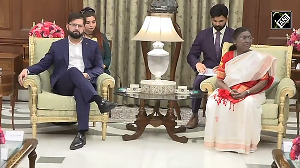President Obama's stop over in Mumbai on November 6 after a long flight from Washington was thought to be largely symbolic, leaving decisions and announcements for New Delhi after meeting with Prime Minister Manmohan Singh.
The encounter with business leaders was meant to compare notes on the problems faced by the two sides. But President Obama made a number of announcements that should gladden the hearts of his voters back home and his hosts in India.
Although jet lagged and exhausted after the election defeat, he went about his business with a sense of purpose and urgency. Scenes of Michelle Obama dancing with students to a Bollywood tune were a fitting finale to a fruitful day.
The choice of the Taj as his home on the first day in India by itself made an impact on India. His speech as well as interaction with the families of 26/11 struck the right note for a leader for whom the fight against terror is an important part of his agenda.
His speech was typical Obama, well crafted, eloquent and full of compassion. He made it very clear where the perpetrators came from when he said that they "came" to demoralise this "country".
Those who criticise him for not identifying Pakistan as the source of terrorism appear to have missed the nuances in the speech. It was not the occasion for him to name any country even indirectly, particularly as he had stated earlier that Pakistan should punish the guilty urgently.
The emotional moment would have lost its poignancy if he had made a political statement, apart from the fact that US presidents generally do not criticise one country from the soil of another. The "P" word may be as much taboo for him as the "K" word and he is likely to keep away from both in public.
The visit to the Gandhi Museum and the tribute President Obama paid to the Mahatma were also special. Heads of states generally visit Rajghat as a matter of routine, but for the President to have taken time off to remember the Mahatma on a busy day in Mumbai is an acknowledgment of what he owes to Martin Luther King and, through him, Mahatma Gandhi.
President Obama took the role of the CEO at the business meet in Mumbai and announced trade deals worth $10 billion (Rs 500 billion/Rs 50,000 crores), which will create 54,000 jobs in the United States. He spoke all the right things about the complementarity between India and the US and proceeded to address some of the key concerns of India even without waiting for the prime minister to raise those issues with him.
The removal of technology denial was on the top of the Indian agenda and President Obama tackled the item directly by announcing the removal of restrictions from ISRO, DRDO and DBL from the Entity List, which had become anachronistic. Of course, the Department of Atomic Energy still remains on the list, but it will not be long before the restrictions on DAE is also removed.
If the nuclear trade had opened up with India, DAE would have been removed in the first installment itself.
President Obama did not use the word 'outsourcing', but addressed the problem without ruffling feathers. Indian industry must have felt pleased that he made it out as though outsourcing was below their dignity as India had much more to offer to the United States.
If creation of jobs in the US is his first priority, it is inevitable that he should criticise outsourcing, knowing fully well that what he says may not make much of a difference to the situation on the ground.
What came as a pleasant surprise was an announcement by Deputy National Security Adviser Mike Froman that the US would support India for full membership of the Nuclear Suppliers Group, the Missile Technology Regime, which are considered preserves of NPT countries and the Wassenaar Arrangement and the Australia Group.
This was a suggestion put forward by a US-India Group in which I participated. The proposal did not appear to get any traction with the non-proliferation guardians in Washington and hence a unilateral announcement came as a surprise.
Of course, the US support will not mean automatic admission for India and the US has to exert some pressure on other members to secure India's admission.
At the end of the first day of the visit, which was marked largely by President Obama acting on his own without any pressure from his hosts, India has gained significantly on the economic front.
Concrete accomplishments even before the official part begins in New Delhi are unusual in State visits. Even when the homework is done and agreements are reached in advance the visitor goes through the motions of discussing the issues with his counterpart.
Tackling the technology denial regime and India's entry into NSG and MTCR are clearly welcome gains for India even before the wish list is formally presented.
The day has paved the way for strategic discussions, now that the economic agenda has been dealt with.
ALSO READ: Suswagatham, President Obama
Is a big-ticket announcement on the way?
Obama 'will take home the dynamism of India's economy'









 © 2025
© 2025